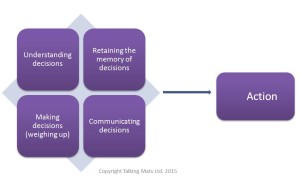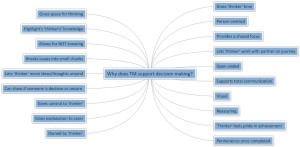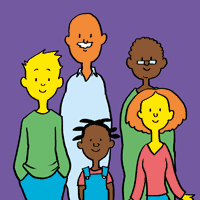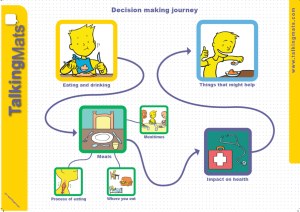What are social care outcomes and how do we measure them? The Adult Social Care Outcomes Toolkit (ASCOT) was developed over a number of years as a way of measuring user views on their social care. The ASCOT has been developed by researchers at PSSRU, University of Kent http://www.pssru.ac.uk/ascot/index.php
There are eight domains of ‘social care-related quality of life’ included in the ASCOT. These include:
- Control over daily life
- Personal cleanliness and comfort
- Food and drink
- Personal safety
- Social participation and involvement
- Occupation
- Accommodation cleanliness and comfort
- Dignity
The measure has been tested with service users from different user groups and there are a number of different versions available, including an easy-read version.
Many people with who have communication difficulties are not able to provide views via interview alone. Talking Mats is a communication tool that can be used with people who have communication difficulties. The mat consists of a set of symbols or pictures that are tailored to the subject you want to talk about.
The ASCOT Talking Mat: Tizard Centre’s Jill Bradshaw with Ann-Marie Towers and Nick Smith (both from PSSRU) have worked with the Talking Mats team at Stirling to develop three ASCOT Talking Mats. These will enable people to give their views on:
- Where I Live. This is a starter mat, designed to introduce people to the approach and for those people who might find more abstract concepts more challenging;
- My Care. People will be supported to give their views about whether aspects of their care are going well or not going well.
- Control over my Care. People will be given tools to think about how much choice they have over different aspects of their care. The second and third mats have options for both basic and more abstract concepts.
The TM version of the ASCOT will enable researchers to investigate user views regarding social care outcomes. By using this more inclusive methodology we will be able to engage with these seldom heard groups. The use of symbols in combination with a structured approach will enable us to represent these participants’ own feelings/perspectives in the research, rather than us having to rely on the views of proxies.
Researchers at the University of Kent will be piloting the ASCOT Talking Mats with people with dementia and people with intellectual and developmental disabilities (learning disabilities).
Jill Bradshaw (Accredited trainer) Lecturer in Learning Disabilities, Tizard Centre, University of Kent
Ann-Marie Towers (Research Fellow) and Nick Smith (Research Officer). PSSRU, University of Kent
Background
Social workers are required to complete a detailed assessment of their client’s needs. It is recognised that it can be a challenge to ensure clients fully participate in the process if they have cognitive or communication difficulties. The City of Edinburgh Council were keen to explore if we could adapt their standardized assessment tool and make it into a Talking Mat framework. Several staff in the council are already skilled practitioners in Talking Mats so are familiar with the framework and use Talking Mats in their practice. They are enthusiastic about the benefits of using Talking Mats both in terms of how it increases participation of service users but also because in their view it makes interviews easier for staff to undertake.
Structuring Talking Mats assessment framework
In order to develop the bespoke Talking Mat we held a seminar to discuss the social work assessment tool and approach used. Six key staff attended the seminar, facilitated by two Talking Mats associates. The discussion at the seminar identified a structure that would enable us to construct a coherent visual conversation that would cover the issues required to complete the assessment, using mind mapping to support this process. It is also important to identify a top scale that matches the question you are asking and make sure the options you are including are neutral and not leading.
The structure that emerged from this discussion is a Talking Mat that enables people to explore their views on 3 topics
- their home
- their health and well being
- their community involvement
Trialling the Talking Mats framework
Talking Mats then took the mind maps and developed these into symbol sets that were piloted by social work staff. At the end of the pilot a review was held and changes made which included alterations to
- the language used
- the symbols used
- the topic an option was included under
- making it clearer to staff when options were more abstract and required further explanation and or personalisation
Nicki Ewing from Edinburgh City Council who leads on the project says ‘ I am very excited that staff have a tool that can make assessment more meaningful for service users to participate in and makes it easier for staff to get good quality information’.
Next steps
We are thinking of holding a focus group for others that might be interested in using the framework for their practice if, you are interested please contact Lois via the info@talkingmats.com email – call your email ‘social work focus group’.
The inability to make a decision could be because of a learning disability, mental health problems, brain injury, dementia, alcohol or drug misuse, side effects of medical treatment or any other illness or disability. Click here for further information.
Both the Mental Capacity Act (2005) in England and Wales and the Adults with Incapacity Scotland Act (2000) identify the following components which determine whether or not someone has capacity to make their own decisions.
There are a number of additional assumptions that are central to determining whether or not someone has the capacity to make their own decisions:
• Every adult has the right to make decisions unless proved otherwise
• Everyone should be supported to make their own decisions
• People should be given the support they need
• People are entitled to make their decision – good or bad
• Each individual has a different capacity to make decisions about different aspects of their life.
We have been running seminars on how Talking Mats can be used to support a person’s capacity to make decisions.The diagram below illustrates some of the comments we received form participants at a recent seminar about the benefits of using Talking Mats to support decision making.
Click on the diagram to enlarge.
The process of completing a Talking Mat helps people retain their view and if they have memory problems the picture of the mat is a good prompt to enable recall.
Its worth noting that our brain processes visual images 60,000 faster than text!
Getting feedback on AAC services is particularly challenging because of the communication support needs of this group of people. It is therefore really important for AAC users to have the chance to say how they feel about the services they receive. Services need to make sure that this group of people have a voice and that there is a mechanism for their views to be taken into account in monitoring the quality of services and service planning.
NES has funded the opportunity for professionals to attend a seminar and go away with a resource to support them to get feedback from AAC users about their service. The Talking Mats resource was trialled and developed with Forth Valley AAC partnership and is based on AAC quality indicators (NES 2013).
This opportunity is free of charge to people in AAC partnerships in Scotland. You will attend a half day specialist seminar and go away with a free resource to use in practice.
The resource will help people find out how AAC users feel about:
- People who work with them
- How AAC services are delivered
It provides a model of good practice which could be extended to evaluate other services.
4 dates and locations are available.
Edinburgh- Tuesday 17th March 1.45 -4-.30pm
Dundee – Wednesday 18th March 1.45 -4.30pm
Glasgow Thursday 19th March – 1.45 -4.30pm
Inverness Friday 20th March 1.45 -4.30 pm
If you are trained in Talking Mats and wish to take up this great opportunity, please book your place as soon as possible.
sally@talkingmats.com or rhona@talkingmats.com
It is recognised that it is difficult for people with communication disability to give feedback to health service staff. The group that developed the Making communication even better resource decided that mystery shopping would be a good way to find out whether health staff were supporting their communication and enabling them to access the services that they require and are entitled to. Funding was sought and gained from NHS Education Scotland for a small mystery shopping project.
20 people with communication disability were involved in the project which was coordinated by Talking Mats Limited and the Stroke Association Scotland. There were different aspects of the project – making phone calls, face to face visits and recounting personal experience . It covered the 14 Health boards in Scotland. The project report was named ‘Through a Different Door’ as this reflected the overall findings that people had highly varied experiences of interactions with health service staff ranging from the excellent and supportive to poor which had the further risk of endangering patient safety . Click here to read the final reports
Over the past year we have been funded by the Scottish Government to develop a Talking Mat to enable adults with Learning disabilities to raise issues of concern. We have worked in close partnership with Survivor Scotland and Kingdom Abuse Survivors Project . Together we have developed and trialled a Talking Mat . The final report for this project is here :Talking Mats and Survivor Scotland final Report
This year the Scottish Government recognised the value of using Talking Mats as a conversation framework to enable people with learning disability to reflect on their lives and express their views including raising any areas of concern. One of the key themes from the national Scottish strategy for people with learning difficulties ‘Keys to Life’ is to keep people safe, but it was also recognised that the Talking Mat that had been designed could also help with other themes –
- Helping people with learning disabilities stay in control
- Shift the culture and ensure care is genuinely person centred
- Evidence that the views of people with learning disabilities have been taken into account
- Support people to cope with adversity and loss and enhance resilience
- Address health inequalities and reduce early deaths
The Scottish Government has funded a 3 year project which we are calling Keeping Safe.
This project will
- Produce a new resource based on the feedback from earlier projects This has 3 topics of conversation . Firstly ,How people are feeling about their Health and well-being secondly, their relationships. For people who are able to think and express their views at a more abstract level the resource has a third topic and gives them space to reflect on their thoughts and feelings.
- Train staff in the 14 health boards across Scotland to use Talking Mats and this resource specifically. This training will be provided jointly with KASP so staff can be supported to think through how they respond appropriately to any concerns that may arise
- Ensure that all health board areas have accredited trainers who will be able to lead ongoing training and sustain use of the resource
If you work with adults with learning disabilities in Scotland and would be like to be part of this exciting initiative please contact us at info@talkingmats.com.
We are launching our fantastic eating and drinking resource to support shared decision making. This has been co-produced with the help of people with eating and drinking difficulties and a range of different professionals. The resource is designed to help people think about, discuss and make informed decisions about how to manage their eating and drinking more safely. People with eating and drinking difficulties should initially be assessed by a qualified Speech and Language Therapist and Dietitian who will recommend appropriate strategies to help them eat and drink safely. This resource is particularly useful in helping people understand the effect that their eating and drinking difficulties can have on their health. It also helps people talk about how they feel about recommended strategies.
When discussing eating and drinking, there are many issues to consider. We have provided symbols under three main topics to help present ideas in a structured way that reduces the likelihood that the person will be influenced.
Click on this image to see it more clearly.
Discussing these topics separately means that people can firstly consider how they feel about different meal times, where they eat and types of food and then think about the impact that their eating and drinking has on their health. It also allows people to have a conversation about some of the suggested strategies and how acceptable these are.
We have run seminars specifically on this new resource in London and Stirling
Contact info@talkingmats.com for further information if you wish to attend a seminar in the future.
Thanks to Andrea McQueen from Australia for this lovely blog describing the Good Things Project which shows how good communication is central to active participation for people with intellectual disabilities
Across the world, many thousands of people with intellectual disabilities live in group homes. These are houses in the community shared by about four to six people with disabilities. Many of these people have communication difficulties of various sorts.
Communication is essential to many activities both within the home (e.g. making a shopping list, choosing what to watch on TV, letting your house mates know when you need some space) and beyond (e.g. developing and maintaining friendships; participation in education, employment and leisure). For many group home residents, participation in these activities relies on access to appropriate augmentative communication systems, and to trained staff who can support their use.
In twenty years working as a speech pathologist in Australia I have been in and out of a lot of group homes. Some do things better than others. Some value communication more than others. Some group home staff routinely use augmentative communication systems, such as Talking Mats, Key Word Sign and pictorial timetables. Unfortunately many do not. Each time I leave a group home, I ask myself the same question: “Could I live here?”
When I first came across the Roydon Street group home here in Melbourne I was impressed. This is a house where communication is respected, where people are listened to, and where genuine choices are offered. It’s not perfect, but it passes my simple test – it is a place where I could imagine living a good life.
I wanted to share the philosophies and practices of Roydon Street around the world. I hoped to influence other group homes to adopt the same simple strategies for their residents. So I sought funding and made a video – Good Things.
The Good Things video aims to show how simple communication strategies can contribute to a good quality of life for people with intellectual disabilities in group homes. It demonstrates how a culture of respect and autonomy can develop when staff understand how to listen to clients and support their communication methods. It shows what is possible in a sector that gets a lot of negative publicity.
Good Things was funded by the Victorian Department of Human Services, and the closed captions on the video were funded by the City of Bayside. The video is the result of a partnership of many agencies and individuals. Special thanks to the residents and staff at Roydon Street. Good Things was released on YouTube in March 2014, and to date has had more than 800 views in 17 countries (not quite keeping pace with Lady Gaga!). It’s a small project, but I hope it has made a difference. I know the team at Talking Mats shares the passion for improving the lives of people wherever they live, and I would love to hear from others with an interest in this area.
Click here to see the Good Things video
Andrea McQueen
Inner South Communication Service
Email: amcqueen@cbchs.org.au
Twitter: @aj_mcq
Angela is a speech and language therapist in Northern Ireland where she works with people with learning disabilities. She worked with John who had some difficulties with eating and drinking. Together they used Talking Mats to help John understand his risk of choking and identify foods which were easy or difficult to eat. Watch this film clip where John describes how Talking Mats helped him to understand and manage his risk of choking.
My name is Karin Torgny, I’m from Sweden. My background is in journalism and culture studies. I used to work in “The Development Centre for Double Exposure” for many years, and our mission was to improve and spread knowledge about violence against women with disabilities. My special interest during these years was AAC. Today I work for Unicef and in different projects on human rights issues.
A year ago I did my accredited Talking Mats training in Stirling, Scotland. Since then I have given my first course in using Talking Mats when talking about abuse and harm. It was a great experience and an opportunity to work with an enthusiastic group of women who were open and willing to communicate using symbols. They are all in an organisation working with girls/women with intellectual disability exposed to violence and oppression in the name of honour.
I think Talking Mats is a good tool when approaching difficult subjects and I hope to run more courses like this in Sweden in the future. Lately I was interviewed on the Swedish Radio and talked about the use and possibilities with Talking Mats when someone is exposed to harm and abuse.
For those who know Swedish (!), here is a link to that program, http://t.sr.se/1mxZv9W
I am also curious if someone else is doing something similar. If so I would be interested to know more. Send an e-mail to: karin.torgny@gmail.com
Have a look at how Talking Mats has been used in Scotland to support people with a learning disability to disclose issues of concern: Survivor Scotland
 Online training login
Online training login 










